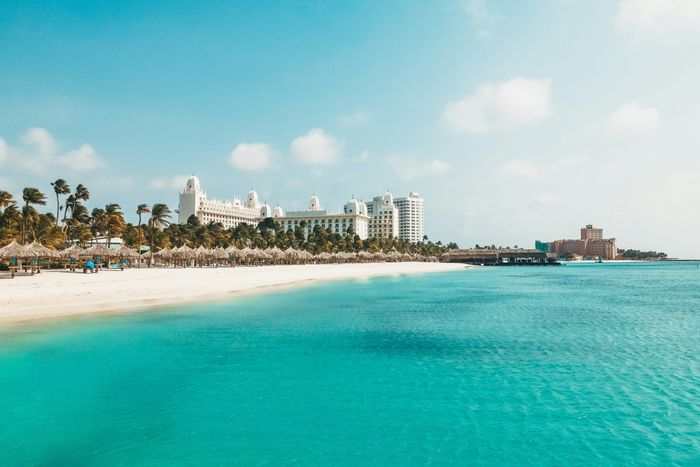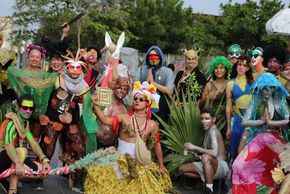by Lea Thin, freelance author
Aruba is a typical Caribbean Island: behind the image of the One Happy Island with white sandy beaches and turquoise sea lies a long history of colonial exploitation – from timber exports and livestock farming to the oil industry and, as of today, mass tourism. The economic dependency on tourism accepts profound environmental destruction – and comes at the cost of cultural identity, traditional knowledge, and biodiversity.
Devastated Landscapes, Erased Memories
The current state of Aruba’s landscape is the result of centuries of colonial exploitation. The signs of biodiversity loss are drastic: the landscape marked by cacti, succulents, and endemic species like the Aruba rattlesnake and the burrowing owl, is increasingly being replaced by a concreted tourism infrastructure. Off-road tours, unregulated water sports, hotel expansions, and wastewater plants all destroy sensitive habitats on land and at sea. “The rapid development of the tourism sector in Aruba has led to massive infrastructure failure: waste was openly burned until the end of 2023, and even the new landfill system using so-called ‘Envirobales’ (editor’s note: compressed waste intended to be used for energy production) raises ecological concerns due to a lack of reliable data. The island’s only sewage treatment plant is chronically overburdened and discharges partially untreated wastewater into the sea, where studies already show large-scale lifeless zones,” explains Oriana Wouters, climate justice activist and head of the Feelin’Hot! project. Mechanical beach cleaning and the lack of natural vegetation further disturb coastal ecological balance: “Our beaches are artificially replenished – with fine sand that heats up faster. This even affects the sex ratio of hatching sea turtles, which is temperature dependent.” Traditional ecological knowledge has also been displaced, Wouters notes. “Aruba’s hot, dry, cactus-rich ecosystem is often seen as worthless – a misconception that leads people to perceive tourism infrastructure as an ‘upgrade,’” says Wouters. “But what’s being lost isn’t just natural resources – it’s also passed-down knowledge, such as the use of medicinal plants or resilient environmental practices once used by indigenous and local people.”
Green Marketing, Black Numbers
While the damage increases, sustainability is becoming more of a marketing buzzword in Aruba. Campaigns like “Ami ta Turismo” (“I am tourism”) combine emotional imagery with empty promises. The large-scale “Secrets Baby Beach Resort” project – a 900-room all-inclusive hotel – advertises tree-planting initiatives while no greening plan has been published, and protected species on site were ignored by the environmental impact assessment. “If you love Aruba, Aruba loves you back – this marketing slogan of Aruba’s tourism agency suggests a mutual relationship, but it conceals ecological realities,” criticizes Wouters. “It’s not enough for hotels to promote paper straws while simultaneously cutting down mangroves or habitats for luxury resorts. What’s sold as ecotourism is often a cover for business-as-usual. We don’t need cosmetic measures – we need a radical realignment of priorities,” she adds.
Colonial Land Use Planning: Who Decides Aruba’s Future?
The Feelin’Hot! initiative aims to use satellite technology to identify urban heat islands on the four Caribbean Island states Aruba, Curacao, St. Martin, and Jamaica and empowers citizens with accessible climate data, enabling climate-resilient urban planning and political decision-making. For Wouters, the date of environmental quality and decision-making is an expression of deep-rooted inequality: “Heat islands are not neutral phenomena – they are manifestations of inequality. When we talk about climate adaptation, it’s not just about technical or complicated terms – it’s about climate justice.” Current land use policy in Aruba often follows colonial patterns. Nature is either exploited as a resource or conserved in exclusive zones – frequently without including local or Indigenous communities. These exclusionary practices not only exacerbate social inequality but also undermine real sustainability. “Conservation on Aruba has been – and for the most part, still is – a top-down process, led by experts with Western knowledge, but without a connection to place or local history. We import knowledge instead of building our own. We don’t trust in the local population’s ability to shape conservation and innovation themselves.”
Indeed, Indigenous movements like Land Back Aruba and No More Hotels have been calling for a departure from the growth-driven tourism model for years. They criticize that the island’s economic development is primarily geared toward the needs of international investors – and too little toward the needs of the population and the environment. Their claim: a halt to new hotel projects, recognition of Indigenous land rights, and a democratic reorientation of economic policy. Oriana Wouters supports those Indigenous initiatives but has chosen a strategy of empowerment. One example is the movement SyntropicA that started their first course Ban planta awa (“Let’s plant water”) – a community agroecology initiative promoting soil fertility, biodiversity, and water retention that leads to accelerated forest development. The positive response to SyntropicA showed her that change is especially possible when people are empowered to make better decisions for themselves, without having to invest too much time on climate impact, inequalities, and other political jargon.
Global Wanderlust, Local Conflicts
International travel companies, influencers, and media have a clear responsibility, says Wouters. They shape the image drawn of places like Aruba. They should therefore not only pay lip service to sustainability but actively invest in local, biodiversity-promoting projects.
Travel influencers should avoid imported consumer goods, all-inclusive offers, and stereotypical island imagery – and instead highlight local markets, people, and initiatives.
Those who only market a paradise blur all the conflict, resistance, and alternative future perspectives. What’s needed is tourism that doesn’t just hand out eco-labels but seriously questions beneficiaries – and disadvantaged. Activists are calling for a new narrative of travel that doesn’t hide uncomfortable truths. “Decolonization begins with wanderlust. If you want sustainable tourism, you also must be willing to confront the darker sides of travel,” explains Wouters. “We must take responsibility for the images we create – and for the structures we support through our consumption. Tourism must uplift Indigenous voices, not reduce them to exotic accessories. And it must treat biodiversity as a shared legacy – not as an exclusive commodity.”





![[Translate to english:] Strand aus Vogelperspektive [Translate to english:] Strand aus Vogelperspektive](/fileadmin/tourismwatch/_processed_/f/f/csm_5._hugh-whyte-SBOHLtENzEY-unsplash_39ddaf8451.jpg)